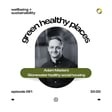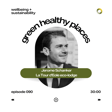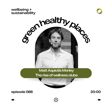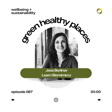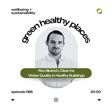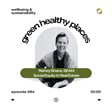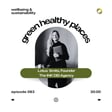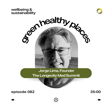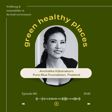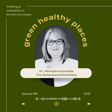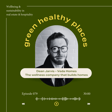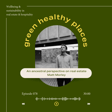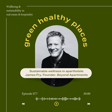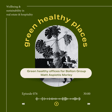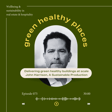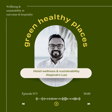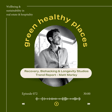Become a Creator today!Start creating today - Share your story with the world!
Start for free
00:00:00
00:00:01

005 Nature Wellness Resorts with James Mark, Therme Group
Transcript
Introduction to Podcast and Focus on Sustainability
00:00:10
Speaker
Welcome to episode five of the Green and Healthy Places podcast in which we take a deep dive into the world of sustainability and wellness in real estate and hospitality. My name is Matt Morley. I'm the founder of Biofilico Design and Biofit Nature Gems, and I'm all about green and healthy places.
Interview with James Mark on Sustainable Wellness Resorts
00:00:29
Speaker
This time around we are with James Mark, COO of the Therm Group UK, the brand behind a number of large-scale, fully sustainable and nature-focused wellness resorts around Germany and Bucharest with a new 28-acre site on the way in Manchester, England scheduled for late 2023 and more in the pipeline it seems. Their first property opened in 2010
00:00:55
Speaker
They launched the flagship product in Bucharest in 2016. It's a LEED Platinum certified fully sustainable thermal resort that receives over 1.3 million visitors per year. With James, we cover everything from therms views on immersive experiences that function as social infrastructure for city dwellers starved of access to nature, the role of biophilic architecture and health oriented landscaping,
00:01:22
Speaker
Dreams of on-site hydroponic farm-to-table dining. The true meaning of wellness in a post-COVID world. And the role art can play in crafting a memorable guest experience.
00:01:35
Speaker
Therm clearly have their sights set on doing big things, not just in the UK, but around Europe. And they do things on a serious scale with lofty ambitions that come backed up with the firepower of scientific research, expert advisory panels and more. I found this fascinating conversation from a brand that has a really bright future ahead. So here's James Mark, COO of the Therm Group UK.
00:02:01
Speaker
James, thanks for joining us today.
James Mark's Background and Role at Therm Group
00:02:03
Speaker
I think a great way to start would be just to have a quick intro from yourself on your own professional background and perhaps link to that and your role at Firm today and within the business. Great, Matt. Thanks very much. And thank you for having me on your podcast. It's a pleasure to be here. So, yes, James Mark. I'm the Chief Operating Officer of Firm a Group UK.
00:02:30
Speaker
We are an organisation that is designing, building and operating world-leading, wellbeing resorts and we are in a process of building our platform for the resorts globally now outside of our central European base. My background is that I've actually come from the events industry and after 25 years
00:02:59
Speaker
previous experience working in venues, international venues and major global events as part of leading the management teams and operational commercial aspects of the business. So from sort of Earl's Court exhibition centre, when it was there, to Xcel London and then everybody involved into the Olympic planning for Xcel.
00:03:27
Speaker
in the Olympic park also for the world athletics and general manager for the stadium. So a whole kind of variety of experience in that space. And now I've come on board to join the leadership team for thermal group UK to, along with my colleagues, lead the expansion of thermal group into the UK.
Link Between Event Venues and Urban Wellness Resorts
00:03:47
Speaker
I mean, it's an interesting connection, isn't it? I mean, if one looks at what them are doing, one might have thought, well, perhaps someone from the real estate world directly or someone coming in from hospitality, but there's an interesting connection there, isn't there, between these sort of large scale event venues and what you're going to be doing within the UK and starting off in Manchester.
00:04:05
Speaker
Yeah, I think it's a broad range of skillset that has come together to develop a business concept like this into the UK. And for sure, we have people on our executive team that have in-depth development experience. And from my side, operating on the client side within venues, I've been involved in lots of developments such as the building of EXA initially and the development of London's International Convention Centre.
00:04:35
Speaker
I'm very familiar with the landscape of designing and building large scale public venues. And of course, you know, ultimately FOMA group is about building facilities that are for the public and large pieces of what we see as sort of social infrastructure projects, you know, to sit in the heart of our cities. And so, yeah, from that perspective and my remit particularly to lead on
00:05:02
Speaker
operational developments and then ultimately take the view of running our facilities. We're a well built team, should we say, for delivering the job.
00:05:13
Speaker
You mentioned the idea of these sort of wellness resorts that exist in the very heart of
Integrating Wellness into Urban Environments
00:05:20
Speaker
a city. And I think, again, that's just a fascinating positioning because one might have thought a wellness resort typically perhaps, you know, outside of the city center, but you're obviously going for that. You're looking to sort of bring that wellness resort concept into a more urban environment. And how does the interplay between water and landscaping fit into that? And how do you integrate all those within a city context?
00:05:43
Speaker
Yes, it's extremely important. It's absolutely crucial to the overall proposition. I think it would be good for me to say a little bit about the philosophy of the organisation because it is quite different from just thinking large-scale wellness resorts that you might imagine out in the world at the moment. So fundamentally, our belief is that wellbeing should be accessible to all.
00:06:11
Speaker
and not just the people that can afford it. And I think what we see often now is high-end luxury resorts that provide incredible curated experiences, but really for a very small percentage of people who can afford to benefit from that, and possibly the people that you could argue maybe need it the least. And so our concept flips that
00:06:40
Speaker
on its head to an extent to say, well, how can you bring the same kinds of experience in terms of offering very high-end quality experiences that benefit people's health and wellbeing, but make it affordable and accessible to all? And fundamentally, part of that is about the positioning of our facilities in the heart of a city. So I mentioned already the words,
00:07:10
Speaker
social infrastructure and that's important because, you know, what we're not building really are large-scale tourist destinations, if you like, that, you know, you could kind of put anywhere and, you know, beautiful setting and people would, you know, come and visit for a civil holiday experience. You know, what we're saying is, you know, that in cities that people have increasingly become disconnected with nature and that is a very, very important part of
00:07:39
Speaker
you know, the makeup of us as humans. And, you know, so philosophically, you know, you can say that, you know, in the existence of humans on the planet, there are only a tiny percentage, you know, three or four percent of people ever have ever lived in cities, you know, over time. But now we're in a time where, you know, 50 percent, according to the UN, of the world's population in the cities, and that is, you know, set to grow
00:08:09
Speaker
So there's been this huge kind of inward migration into cities, and cities are incredible places of excitement and opportunity, but they can also be extremely challenging for lots of people for lots of different reasons. And part of that, we believe, is very much around this belief that as humans, we are from nature, we are part of nature. And in cities, it's very easy to become disconnected
00:08:38
Speaker
from nature and that is fundamentally what we are bringing. We're bringing a facility on a large scale that was set in a city that's for the people of that community, of that city primarily, and helping people find the opportunity to reconnect with nature and all the benefits that we know that can bring and give people that opportunity to
00:09:08
Speaker
have some quality downtime in their lives, but also that they don't have to travel far for it, that they don't have to pay that much for it. It's something they can do regularly. So yeah, I mean, it's the water and landscape aspect of what we do and bringing that into cities and why we are targeting city locations is completely fundamental for those reasons.
00:09:36
Speaker
It's that you can see smaller projects like this going on, whether it's a gym or a co-working space or at most perhaps a residential project. But it's the scale of what you're attempting to do, what you are doing and bringing to the UK in the future that strikes me as really unique. I mean, it's almost
00:09:55
Speaker
I just haven't seen anything else like it outside of places like Singapore where they just seem to have a different perspective on how big they can go and how much they can do. But short of building parks or literally sort of greening the city, you're limited to a small space, an indoor space or at most perhaps a building of sort of modest dimensions.
00:10:16
Speaker
It's really quite ambitious stuff. Where did it all, where did it come from originally? What was the sort of the nascent, the initial birthplace of the idea? Who was behind that and how did it come about?
Therm Group's Sustainable Wellness History
00:10:29
Speaker
Well, the concept, the thermo-group concept dates back to around 20 years ago. It's in its current context, it's about 20 years ago in Germany.
00:10:41
Speaker
And as part of the group now, we have four operating facilities, three in Germany and our most recent facility in Bucharest. And that was very much, you know, I mean, we talk, of course, now a lot about biophilic architecture and creating those spaces to reconnect with nature. But that goes back to 20 years for us in the concept of how you create large scale facilities.
00:11:04
Speaker
that can bring lots of people together at an affordable price point and connect people with nature in that way. So, you know, it's a concept that has been around for a number of years. But really, I mean, if you think about it, you know, if we look back again through all the different cultures around the world, you know, it is fundamental to most cultures to have, you know,
00:11:31
Speaker
a culture of health and well-being that's that has some kind of water-based activity in terms of healing and well-being and that sort of culture of thermal waters you know clearly for the UK you know going back to of course the Romans who brought the bars to to the UK all those years ago and then through our through our history you know you can see these peaks and troughs at times when it was very much in fashion that people
00:11:59
Speaker
understood the benefits through the different times of Victorian baths and outdoor swimming, the Lidos and all those sorts of experiences that were there and taking the waters. It's there in our culture. It's just we have lost sight of it really in the most recent century. And that is for a number of different reasons. But we do think that now is the time that there's a real opportunity to help to bring that
00:12:29
Speaker
forward again at a time when people are so focused on wanting to lead healthier lives, that the whole feeling around preventative health, the health agenda is coming back really strongly in this country. And of course, in some parts of the world, that was never lost. But in this country, I think it's definitely taking the back seat. So working with
00:12:56
Speaker
you know, in the communities that we are working with in the UK, also around the world, you know, working with the local authorities, you know, the health agencies, etc, is really an important part of it, because you're bringing, you know, lots of opportunities for people to take a bit more personal control over their health and wellbeing in a preventative way.
00:13:18
Speaker
So obviously, on each new project, you're coming in from a development perspective, and then once the sites agree, then you're quite quickly getting into the architecture and engineering piece. Now, you mentioned architecture a moment
Bio-True Architecture and Human-Nature Interaction
00:13:30
Speaker
ago. The group has a sort of proprietary, bio-true architectural style. Can you explain a bit about how that works and what its sort of key makeup is about? Yes, absolutely. So I mean, it's a very close
00:13:45
Speaker
you know, kind of derivative, if you like, of a biophilic architecture, I'd say that, you know, for us, we wanted to create a term that was representative for what we believe. And I think, you know, it is about biophilic architecture. I think the particular element for us that we wanted to make very real is the truthfulness of it, you know, that what we're trying to do is not, I guess, recreate
00:14:13
Speaker
nature as a kind of spectacle for nature's sake if you like, but actually it is very much about creating true natural environments and then how humans interact with nature within that environment. So I'll give you an example because we work with lots of different people around the world that research sits absolutely fundamental to everything we do. So there's always this common theme of
00:14:43
Speaker
very well researched and thought through strategies. So for example, we're working with a professor in Florence who is a plant neurobiologist called Stefano Mancuso, who's a great friend of Thermogroup. And he looks, for example, at the different aspects of the human interaction with plants, and of course using plants to create fantastic
00:15:12
Speaker
air filtration systems within buildings, but also to think of it the other way, that we are all part of one ecosystem ultimately and what's our impact on plants in our own environments. So we're kind of looking at all different aspects of this relationship between plants, animals, humans,
00:15:38
Speaker
and how we all interact together and share the planet as one ecosystem. And I think what we try and do is represent that in our architecture, in what we call this a bio-true style that fundamentally, it is very much about designing spaces that generate wellbeing. Maybe another example I can give is
00:16:05
Speaker
is also the research we do around, as we say, the science of well-being and how that might impact our architecture and the idea of us creating bio-true buildings. So we have a partnership that we're working with the University of Glasgow, the Customology Department, COSHTO, and that has stemmed from
00:16:33
Speaker
really a very simple thought of trying to understand, well, what is wellbeing? What does it mean at a kind of philosophical level, right at the outset? I think wellbeing would all say is a very kind of overly used maybe word nowadays in the same way that sustainability kind of went through that time of being the kind of word that everyone needed to be saying in their kind of marketing materials or whatever else.
00:17:01
Speaker
And I think wellbeing possibly is coming to that point now. And we're like, well, no, you need to understand generally what wellbeing means and how to translate that into buildings and architecture and the way people feel. So we started this program with them called the Dimensions of Wellbeing. And it's very much around that. So look, you're right back at the fundamentals about what makes humans feel good and how architecture then
00:17:30
Speaker
can influence the way that people feel about being in a building. And so trying to develop that understanding and put some science behind the belief of well-being, what it means for people today. So we look at all these sorts of different aspects and interactions, and that all comes together into this concept of bio-true architecture.
00:17:55
Speaker
It's this really fascinating crossover I think between those players who've been talking about biophilic design and biophilia and bringing the outside world in or indoor outdoor spaces and this the current context that's going on around us where almost you know we're having to
00:18:18
Speaker
rethink our relationship with the planet and in many cases a more natural environment in an urban context is going to be far healthier than any previous version that we've been able to put out there. It seems like the current shift clearly in a post-COVID world is just opening up this
00:18:39
Speaker
really interesting dynamic around how actually nature and returning to a more natural state without trying to go backwards, just adapting to a more natural state. So when we think of, say, the project in Manchester, already there I can see that these are surely part of the selling point, part of the
00:19:00
Speaker
of the, if you like, the amenities and the services that you're offering, there must be something there around that natural state of health and wellbeing, right? Yeah, very much so, very much so. And I think, you know, what our resorts bring is a real fantastic kind of exciting balance between, you know, having fun and kind of passive activity.
00:19:26
Speaker
which all leads to having some great positive health and wellbeing outcome. It's brilliant because you just need to stand in the lobby of one of our facilities and see the expression on people's faces when they go in and what they look like when they come out. You can just see the positive impact that a few hours in one of our buildings has had.
00:19:51
Speaker
It's made up of three or maybe four different sort of concept areas within a facility. So typically what you would find, and this will be also true in Manchester. So we have a kind of a family fun area, which we call galaxy. And that's, you know, great fun for the kids with the water slides and wave pools.
00:20:15
Speaker
but also the relaxation elements for the parents as well. So you can still benefit as a family from different experiences. Then we have Palm, which is more an adult relaxation area with mineral pools and kind of a very large sort of generally hydrotherapy pool with retractable roof to be able to make the most of creating the best possible kind of air and natural ventilation.
00:20:43
Speaker
We have an Elysium, which is where we have all different types of saunas and steam rooms. We have an incredible, it's a very theatrical element to the saunas, which is called aufguss, which is a German word for infusion. And when you spend time in one of the saunas, you have an aufguss experience, which is kind of led by one of our aufguss masters. They are using essential oils, different
00:21:12
Speaker
uh, sounds, meditative, meditative experiences to kind of create this kind of incredible, you know, five minutes or so of, uh, of sauna experience, um, which is just a wonderful thing. And then finally, the Genesis area, which is all about looking back to the origins of wellbeing. And as I said, you know, when you look through the, through the cultures, uh, around the world, you know, that everyone, uh, everywhere really has a culture of wellbeing and Genesis is about trying to bring
00:21:42
Speaker
all the different cultures from around the world, you know, into one space and then using technology, which is a really important part of our business. It's a platform of technology that helps to deliver all the experiences to lots of people using technology to do that. So, you know, what might have been traditionally one-to-one treatments, you know, you can do with technology to reach more people. And again, that makes it kind of an affordable experience and the very
00:22:12
Speaker
Yeah, obviously a very, very, very enjoyable one. So you get all these different things coming together. And, you know, of course, as I said earlier on, this is a feeling of being based in the community. And of course, that means that what you don't want is it's just a kind of, you know, how can we say that it's something that it's kind of from outer space, it's sort of lands, you know, in the middle of a community and it's not at all connected to that community. So, you know, we're very careful that, you know, everyone we do, you know, will have
00:22:41
Speaker
of core elements of creating these incredible kind of biodiverse environments, indoor tropical environments. But, you know, and with those elements that I've just mentioned of this proposition, but then very much is kind of embedded into the local community. And by that, sort of thinking about, you know, what the, maybe what the natural resources are in that area. I mean, in Bucharest, for example, we use geothermal water there because it's available
00:23:11
Speaker
Manchester, maybe not that, but we'll be looking for other renewable energy sources. But they're working with the community and that's at a kind of a local government level to really think about how you can work with local governments to make the most of the opportunity of a thermal. So, for example, in Manchester, working with the mayor's team and really looking at
00:23:40
Speaker
best of health and social care strategy and thinking, well, how can thermogroup be part of that? And how can we help design programs, for example, that deal with particular challenges for them? And then thinking about how we work with the immediate borough with schools, other health centers,
00:24:03
Speaker
you know, all sorts of different aspects of the community, because that's what makes it unique, you know, and you find the identifying features. So, you know, in Manchester, one of the key aspects in terms of the iconography of it will be our central rose. And the rose is a well-being garden that still sits in the middle of
00:24:31
Speaker
the facility and be kind of accessible from different areas. And within that rose, you know, so when you see it from, you know, look down from above, if you like, on Google Maps, you know, you'll see the shape of the building that will have this rose outline in this garden. And that's very much about, again, about a place of, you know, linking to, in the UK, obviously, with kind of in England, particularly keen gardeners. And the rose is very iconic as a flower.
00:24:58
Speaker
but always looking for the connection points to how a project will, you know, will kind of be well knitted in, shall we say, with the local community. And then there'll be lots of experiences within that rose garden from water-based experiences, but also to kind of art and cultural activities as well. So then there is that sort of bridge into a more aesthetic
00:25:29
Speaker
component to the offer. And I've often thought that biophilia has that.
00:25:34
Speaker
that element of beauty to it, if you're open to it, if one sort of is able to tap into it, it's clearly there.
Art's Role in Wellness and Spiritual Well-Being
00:25:42
Speaker
How have you integrated art? Because it's obviously a big part of the brand concept overall. How does that play out in terms of the actual guest experience? Is it explicit or is it something that sort of is just subtly integrated overall? So, Matt, it's both really. I mean, I think, you know, on the kind of explicit front,
00:26:02
Speaker
We see it very much as sitting as part of the spiritual well-being aspect. Again, as humans, by being in environments that are influenced with art and art and architecture and design, that is part of supporting healthy spiritual well-being.
00:26:25
Speaker
and makes you feel good and have that appreciation. I think that we have that belief that the role of art in our society is that it, and historically very much so, art and culture has been the driving force behind society and changes in society, always leading. And this relationship between
00:26:53
Speaker
between art and a culture and humans. Again, we are going right back to primitive man with expressing through cave paintings, for example. It's always been a central part of our culture and society. So I think certainly enhancing the environment with art, bringing it out of museums and galleries and bringing it into a place where
00:27:23
Speaker
you know, it can, the arts can have more public and wider appeal and more impact on a wider group. But also the way that it then, you know, it then influences the experience. So whether it's using water or sculpture or painting, you know, all of it can help to enhance the environment. And of course, you know, for us and on this topic, it's very much around, you know, thinking about the relationship with art and nature and using
00:27:52
Speaker
art and technology actually to a nature to create really exciting new art pieces. And we have a very, very, very strong thermal art team and program that is working around the world with partners such as Serpentine Galleries and Pace, the British Council, Somerset House in London. So we're working with lots of organisations and also
00:28:19
Speaker
lots of individual artists and architects and parts of our art board to really look at how, you know, arts and culture can influence, you know, city design as well. And the thinking around, you know, cityscapes looking forward and the arts role within that. So it's kind of at a macro level. And we organize many forum events. We have a series going now called the Wellbeing Cultural Forum. They're looking at lots of different
00:28:46
Speaker
aspects of civilization and city design going forward. And then at a micro level, as in our facilities, whereby you might have an artist, for example, help design a particular sauna. And the people, when you go into it, you might not realize that you're actually inside a piece of art. Some people might not realize it. Other people might think, oh, this is incredible. They'll have some kind of impact on them. But it's how you use art then in design.
00:29:16
Speaker
to bring about a better outcome and a more interesting outcome for those people and ultimately to benefit their wellbeing. So yeah, definitely the role of art is pivotal really in our proposition, as I said, both at kind of macro thought leadership level and the day-to-day of our facilities.
00:29:43
Speaker
Increasingly, we're seeing both the lead, the US Green Building Council and the well-building certifications recognizing or looking for ways to recognize projects and developments that do exactly that, which is to put an added priority around
00:30:02
Speaker
uhm aesthetic beauty and it's hard to pin down obviously without from a objective position but the certifications at least have now found a way to give credits effectively for for those projects that do it so obviously playing in that space just take a step back that the lead and well certifications you've often gone for both on each project how do you see those
00:30:24
Speaker
Is it a purely B2B play? Is it more about adding value to the real estate? Or do you think it's almost sort of future-proofing the projects because that's where buildings are going to be in 10, 15 years' time? What's your take on that? I think that as kind of any certification scheme, it has its positives for sure in helping to place it in people's minds as a sort of reference point. I mean, for us, it's not about
00:30:52
Speaker
you know, creating buildings to kind of tick a box in that way with, so it's been ticking the lead box. But for sure, you know, we are proud that our Bucharest facility, you know, is the first building of its, in its category to achieve lead platinum. And I think that, you know, it does set a standard. It sets a standard for us, you know, as we're thinking about our future projects, you know, it helps as a reference point where you're
00:31:20
Speaker
talking to new regions about what we do and how we do it. And I guess, you know, as term a group, you say the UK is as yet fairly unknown. Even though, you know, the concept has been around for 20 years, you know, the UK and other parts of the world, you know, not not yet. That's that's what it helps to build
00:31:45
Speaker
the level of gravitas confidence that this is a serious proposition and for sure there will be other things over there in time that we will also push on and I wouldn't put it out of our realm that we would think of
00:32:06
Speaker
potentially setting some new standards that maybe don't exist yet, because working with others, particularly listening to some of your other podcasts, some of the guys you had brilliant speakers on previously, and everyone is playing now, playing, I don't mean that in a derogatory way, but we're all part of a movement now, I think, and trying to raise this awareness of biophilia again.
00:32:34
Speaker
It's something that I think that the more people are talking about it, using those kind of certification schemes helps to raise that awareness. So yeah, it doesn't drive our strategy, but it's helpful. And yeah, we will continue to use them for the time being certainly.
00:32:53
Speaker
I really fully support it. I think it's also that combined with the work you're doing around the research, plus the more creative edge where you're out there doing the things that you're doing around art. And I think it's a really powerful combination when you put those things together. It's quite unique,
Future Site Development Plans in the UK
00:33:11
Speaker
really. Looking ahead, future plans for site development. You've got the UK Remit. You've got Manchester. You've got a pin on the map. What's in the pipeline? Or what are you able to talk about at the moment?
00:33:22
Speaker
Yeah, so I mean, we have a global strategy and the UK is part of that global strategy. So we are in discussions and on the MOUs and various regions around the world from Asia Pacific through to North America. Myself, my colleagues are tasked, if you like, to focus on the UK. We believe that there's an opportunity in the UK for us to
00:33:50
Speaker
develop a number of sites, probably maybe five sites from the UK that could reach maybe 90% of the UK's population being within easy reach of a thermal resort. From a kind of aspiration perspective, that is what we believe is achievable and what we are setting out as our strategy. If we could
00:34:12
Speaker
if we can deliver on that over the next 10 to 15 years, that would be an astonishing success for UK PLC. And I think that fundamentally is what's behind it, is that we can create and have really meaningful impact on many, many people's lives in the UK. So we're looking in Scotland, we have advanced talks underway in Scotland, also
00:34:42
Speaker
in Wales for the South West region. Obviously Manchester is planning permission is being granted and we're progressing through to starting on site next year. And then in the London and the South East, in London and South East, where we see the opportunity maybe for two thermo resorts and again, sites on the discussion. The intention being that we identify sites, that we work with local partners, local authorities,
00:35:11
Speaker
And then we move through in a kind of a phased way to roll out the thermal concepts, if you like, thermal concepts throughout the UK, to the benefits of many, many people. So in thinking about possible new features that you're looking to add or that you're integrating in that are really sort of out there on the innovative scale, what about, for example, food
Innovative Food and Nutrition Approach by Therm
00:35:36
Speaker
and nutrition? How do you tackle that within the resort context? Yeah, it's a great question.
00:35:42
Speaker
To be honest with you, one that I'm personally very excited about, because we are looking at developing a new concept around food and beverage, which will be really entirely innovative, I think, within the sector. I mean, already, of course, we consider the importance of food and nutrition on health and wellbeing. I mean, it's a kind of a given. But to think about how you take that forward, what we're really focused on is how you create
00:36:12
Speaker
say, curate an experience, a food experience that is, it could be very personal to that individual. And by that, you know, really thinking about, well, what is going to be good for that person? And how do you help them make the right food choices whilst they're in, whilst they're inside the firm? And that obviously, we're thinking about how you might then monitor, you know, take certain readings, understand more about the person.
00:36:36
Speaker
to be able to then help them with their dietary requirements. And of course, as we know, we're all different and it's not just about likes and wants, it's about, you know, actually what's going to work for us and then helping us to make those decisions, you know, long-term. But of course, also really important is food provenance. And on that note, you know, we're really thinking about, well, how could we, you know, genuinely create a system whereby
00:37:03
Speaker
you know, thinking about vertical farming, for example, you know, on site, you know, how can you, you know, in cities, one of the challenges is, you know, food production and, you know, and obviously, all the challenges of moving food around the globe. So how do we really work with local suppliers that possibly, you know, grow our own, create these new systems of being able to develop menus that come straight from the source of the food production?
00:37:31
Speaker
And literally, you know, how amazing would it be to actually have food, you know, harvested and be on a table, you know, within a matter of an hour or two, you know, because of the way that's being set up. So, you know, we're really thinking hard about that whole food experience on a personal level for the individual from a wellbeing perspective, but then also at a kind of organisational level and what is, you know, what is right on the scale that we're operating on to be able to deliver sustainable
00:38:01
Speaker
sustainable field in various propositions.
00:38:05
Speaker
It's a fascinating concept. It's going to be really, really interesting to see how you roll it out over the next few years. I'm going to be respectful of your time. Thank you so much. I think there's a lot in that. There really is. There's so much to unpack from what you're up to. It's just great to see such large scale and sort of bold projects coming through now in this space. So good on you. Thanks very much. Thanks, Matt. Maybe if I could just leave you with one. The once the final thought of that is just this
00:38:33
Speaker
you know, the real kind of intention to be creating these biodiverse facilities in our cities, you know, which are affordable, which are inclusive, you know, that have over 200 plants inside, you know, all the different aspects of health and wellbeing. And the thought I really want to leave you is that we recently published a paper, which we've entitled Human Cities, Increasing Urban Wellbeing.
00:39:03
Speaker
And if I believe one message would be to people maybe to have a look at the website, check that out at firmagroup.com and have the ability to download that green paper. It's really focused on
00:39:21
Speaker
trying to raise the discussion awareness of some of those challenges as we've been talking about today and giving some thoughts around what, maybe what cities of the future could be thinking about and working with lots of colleagues such as the people you had on previously. So yeah, thank you very much for your time today, Matt. It's been a pleasure to talk to you. Thank you.
